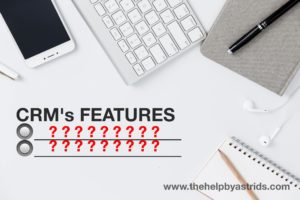
Here are a few special features and capabilities to consider when deciding on a CRM to use for your Small to Medium Business.
Customer Information
A good CRM should at the very least be able to hold records of all your customers. The key features to look for are:
- Relationships: the ability to relate contacts to their companies and companies to accounts are all important features
- Record keeping: your CRM should be able to hold pertinent contact information along with individual and company details
- History: your CRM must be able to record all interactions on all instances of contact with the customer
- Organization: your CRM must be able to organize all your contacts into groups (e.g. prospects, active clients, follow-ups, newsletter sign ups, etc.)
- Others: extra features such as links to the contact social networking pages, display maps of client locations with travel instructions,
Sales and Marketing Tools
A CRM is not simply software. It is a business tool that helps you automate both sales and marketing and, importantly, speed up the buying cycle. Look for these functions:
- Invoicing: the ability to print and email invoices and statements
- Account alerts: during sales, inform you if a customer is in arrears so you can make an informed decision regarding incurring more risk
- Direct marketing: create automated email campaigns and produce mailing labels for direct marketing campaigns
- Customer segmentation: identify customers by any number of categories, the products they buy or location, so that unique marketing and sales activities can be better targeted
Business Intelligence
At the very least, a CRM should be able to show you where your sales and marketing efforts are most effective. Look for the following features:
- Sales Tracking: Allow sales performance reporting
- Targets: Manage sales targets by salesperson or team
- Customer Segmentation: Identify groups of contacts for specialized marketing programs
- Product reports: Provide product sales trends analysis and recommend stock reorder quantities
- Profitability reports: Produce reports that help you strategize how to maximize your profits
Productivity Features
Of course, it would greatly help your staff CRM had features that could enhance their productivity as well. Look for the following:
- Email: the ability to capture all email between your team and customers
- Calendaring: daily schedules and to-do lists and integration with staff calendars (i.e. Google Apps or Microsoft Outlook)
- Mobility: the ability to access contact information via a tablet or mobile phone
- Telephony: A ‘click to dial’ ability that lets staff simply select a phone number on a CRM record, and have it automatically dialed on their phone, while simultaneously recording the details of the call. Also, links to phone systems so that an incoming brings up the appropriate customer record automatically
Deployment options
A cloud-based CRM deployment will allow your staff to access the CRM from anywhere and on any device. However, cloud-based solutions require a reliable internet connection. If you are an in an area where broadband is patchy, you may wish to consider an on-premises solution instead.
Try before you buy
Use the free demos that are available from most CRM vendors. Frequently, these free trials allow you to experiment with a small set of your customer data, so you can test how well each solution works for your business. Be on the lookout for small, add-in features that make a big difference. Ask yourself “How does this tool help my business?”
That’s it for my tech series on Small Business CRMs. If you have questions or CRM recommendations, please feel free to leave a comment. Stay humble and hustle hard!
Written by Jaie O.- The Help